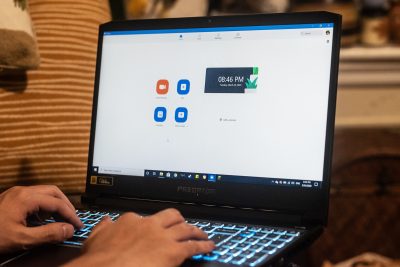
Boston University professors are expressing gratitude for the classroom moderator program as an effective way to help teach both remote and in-person students, but moderators and professors alike said there are still some issues that can be ironed out before next semester.
Classroom moderators are a part of BU’s Learn from Anywhere model, and help faculty facilitate learning for remote and in-person students as well as provide technological support, according to BU’s Digital Learning and Innovation web page.
Student workers have reported communication issues, however. Classroom moderator Alexander Stephan, for example, said he lost working hours due to a class going remote.
“I was in limbo with that for about three weeks, and then the fourth week [I] was contacted through IT, telling me that that class had gone completely remote,” Stephan, a College of Fine Arts junior, said.
Stephan said he would like to see more organization and clarity from his supervisors when it comes to communicating information.
“They’ll send out update emails about stuff, but it’s very vague,” Stephan said.
Classroom moderator Ashwin Vittal said the scheduling system became disorderly after supervisors switched from a scheduling app to a spreadsheet.
“They ended up putting all the shifts in a spreadsheet and saying, ‘Go for it. Free for all,’” Questrom School of Business sophomore Vittal said. “People got essentially laid off at that phase as well because they weren’t able to get shifts.
Vittal said he would like a promise from supervisors to give students hours even if their classes shift online.
“I don’t see any reason why we can’t move that online as well,” Vittal said. “It still gives us a purpose, and people don’t lose their hours suddenly.”
Professors said the classroom moderators have been helpful, although the system has faced its share of issues, according to Robert Buchwaldt, an assistant professor in the College of Arts and Sciences.
“The people who are distributing moderators, when one moderator changes its mind or something like that, don’t really replace the moderator,” Buchwaldt said. “The issue on that is a lot of organizational and logistic issues.”
Despite this, Buchwaldt said his student moderators have done good work. He said the University could do a better job of communicating with professors, as he has only heard directly from moderators thus far.
“I’m communicating with the students and they’re doing a great job,” Buchwaldt said. “Sometimes they just showed up, which is fine, but [Information Services and Technology] never got back to me. I send them email after email.”
Buchwaldt said one of the changes he would like to see made to the program in Spring is consistency surrounding which moderators work with which classes.
“It’s a problem that we don’t have the same moderator over and over,” Buchwaldt said. “You have to explain the same thing over and over.”
Questrom professor Phyllis McGinnis said the four moderators she has for her classes have excelled, despite early scheduling issues.
“I can’t say enough good things about them,” McGinnis said. “They never just walked away and they always took responsibility.”
McGinnis said she was concerned about the technological hurdles of this semester, but the moderators’ knowledge helped ease her worries. Hardware, she said, “scares” her — she likened it to changing a car tire.
“If they didn’t know something, they figured it out,” McGinnis said. “They’d be like, ‘Oh, wait a minute. Let me take a closer look,’ rather than, ‘I don’t know.’ They were very soothing and reassuring.”
McGinnis said she believes communication has improved between IS&T and moderators, and she hopes to have helpers again in Spring.











